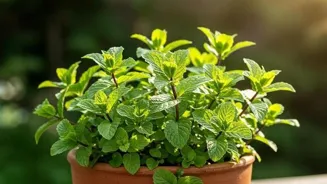Learn how to grow your own organic herbs at home with these 5 simple tips! Start your herb garden journey now!
In today's world, where the market is flooded with produce that's been grown with pesticides
and artificial flavors, more and more Indians are turning towards organic living. What better way to embrace this lifestyle than by growing your own food?
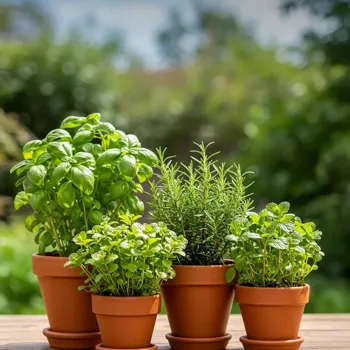
And what's easier to start with than a little herb garden right in your own home? You don't need acres of land or expert knowledge. With just a few simple tips, you can have a flourishing organic herb garden bringing flavor and health to your kitchen.
Growing herbs at home: Fresh, organic, rewarding hobby
Growing your own herbs isn't just about getting fresh, flavorful ingredients. It's also a relaxing and rewarding hobby. Imagine stepping into your kitchen garden to pluck fresh mint for your chai or some basil to garnish your dal.
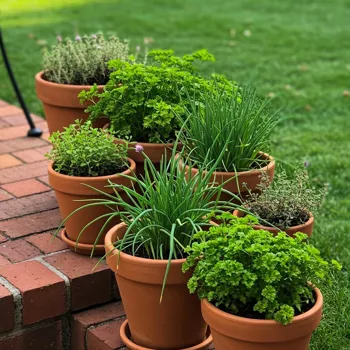
The aroma, the freshness, and the satisfaction of knowing you grew it yourself – it's an experience that's hard to beat. Plus, you are in control of what goes into your herbs, ensuring they are free from harmful chemicals, making them truly organic.
So, let's dive into these five simple tips that will get you started on your organic herb gardening journey!
Select appropriate herbs for your climate and space to start a successful herb garden
The first step towards a successful herb garden is selecting the right herbs for your climate and available space. Think about the herbs you use most often in your cooking.
Common Indian culinary herbs like coriander (dhania), mint (pudina), basil (tulsi), chili (mirchi), and curry leaves (kadi patta) are all excellent options to start with. These herbs are relatively easy to grow and adapt well to Indian conditions.
Once you have figured out the herbs you wish to plant, examine the amount of the sunlight available in your space. Most herbs need at least 4-6 hours of sunlight daily to thrive. A sunny balcony, windowsill, or a small patch in your garden would be ideal.
If you don't have enough natural sunlight, you can also use grow lights. It’s wise to learn whether these herbs are seasonal or can they be grown all year round. This knowledge will enable you to harvest through out the year.
Create herb garden with proper containers in limited space
Consider the space you have available. If you have a large balcony or garden, you can create a dedicated herb bed. However, if you're limited on space, container gardening is a great option. You can use pots, planters, or even recycled containers like old buckets or plastic bottles.
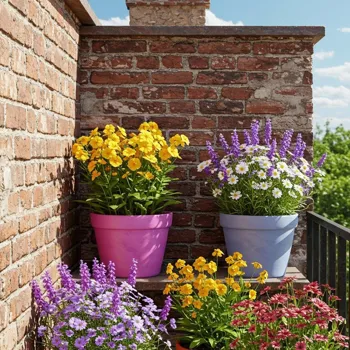
Just make sure the containers have drainage holes to prevent waterlogging, which can harm your herbs. Remember that some herbs, like mint, can spread aggressively, so it's best to grow them in separate containers to prevent them from taking over your entire garden.
Growing together will help provide shade to each other and keep the temperature cool. Do a little research on which herbs thrive together and which ones need to be grown seperately.
Healthy herbs need quality soil, avoid synthetics, enrich with organics, drain well, compost
The quality of your soil is crucial for the health of your herbs. When it comes to organic gardening, avoiding synthetic fertilizers and pesticides is key. Instead, focus on enriching the soil with natural ingredients. Start with a good quality potting mix that is well-draining.
You can find these mixes at most nurseries or garden centers. To further enrich the soil, add compost, vermicompost (earthworm castings), or well-rotted manure. These organic materials provide essential nutrients to your herbs and help improve soil structure.
Avoid using soil directly from your garden without amending it, as it may be compacted and lack the necessary nutrients. It can also contain pests or diseases that can harm your herbs for consumption. Also avoid too much watering as it can drown the roots.
Composting enriches soil for healthy plant growth
Compost is like gold for organic gardeners. You can make your own compost at home using kitchen waste, yard trimmings, and other organic materials. Not only does composting reduce waste, but it also creates a nutrient-rich soil amendment.
Vermicompost, made by earthworms, is another excellent option. It's packed with beneficial microbes and nutrients that promote healthy plant growth. Well-rotted manure is also a good source of nutrients, but make sure it's properly composted before adding it to your soil.
Fresh manure can burn the roots of your herbs. To ensure optimum growth and the health of the plant, you will need to change the soil from time to time, to provide enriched soil again.
Watering and sunlight crucial for healthy herb growth, timing and depth important
Watering and sunlight are two of the most important factors in growing healthy herbs. The frequency of watering depends on several factors, including the type of herb, the climate, and the type of soil. Generally, you should water your herbs when the top inch of soil feels dry to the touch.
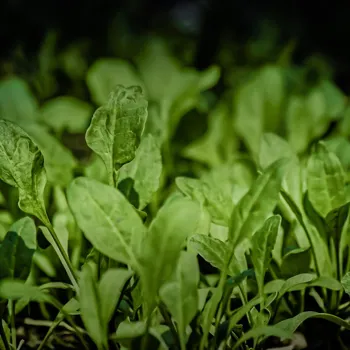
Avoid overwatering, as this can lead to root rot. When you do water, water deeply so that the water reaches the roots. Early morning is generally the best time to water, as this allows the foliage to dry before nightfall, reducing the risk of fungal diseases.
Depending on weather conditions, watering may need to be adjusted. During the rainy season, watering needs to be done cautiously and only when the soil is dry.
Herbs need proper sunlight for healthy growth, watch for signs
As we said before, most herbs need at least 4-6 hours of sunlight per day. However, some herbs, like mint and parsley, can tolerate partial shade. Observe your herbs closely and adjust their location as needed.
If the leaves are looking pale or yellow, it could be a sign that they're not getting enough sunlight. If the leaves are scorched or wilted, it could be a sign that they're getting too much sunlight.
If you're growing herbs indoors, place them near a sunny window or use grow lights to supplement natural sunlight. Rotation of the plants can also help different parts of the plant have equal exposure to Sunlight.
Growing organic herbs: avoid pesticides with natural pest control methods like neem oil
One of the benefits of growing your own organic herbs is that you can avoid the use of harmful pesticides. Instead, you can rely on natural methods to control pests and prevent diseases. One simple solution is to manually remove pests as you see them.
You can also use a strong stream of water from a hose to dislodge aphids and other small pests. Another effective method is to use neem oil, a natural insecticide derived from the neem tree. Neem oil is safe for humans and pets, but it's deadly to many common garden pests.
Apply neem oil according to the instructions on the label. Some herbs like marigold keep pests away from other plants in the surroundings
Proper air circulation key to prevent fungal diseases
Proper air circulation is also important for preventing fungal diseases. Make sure your herbs aren't overcrowded and that there is good airflow around them. Avoid watering from overhead, as this can create a humid environment that encourages fungal growth.
If you do notice signs of disease, such as spots on the leaves, remove the affected leaves immediately to prevent the disease from spreading. Use organic fungicides if the problem persists. Check the plants everyday for any fungus or insects attacking the plant.
Catching the affected plant quickly is the key to keeping the infection from spreading.
Harvest herbs regularly for flavor, growth; cut above leaf node for new growth
Harvesting your herbs regularly is not only a way to enjoy their fresh flavor, but it also encourages continuous growth. Most herbs can be harvested as soon as they have enough leaves to spare. Simply snip off the leaves or stems as needed, using sharp scissors or pruning shears.
The best time to harvest herbs is in the morning, after the dew has dried but before the sun gets too hot. This is when the herbs have the highest concentration of essential oils, which give them their flavor and aroma.
When harvesting, always cut above a leaf node (the point where a leaf grows from the stem), as this will encourage new growth.
Pruning herbs for shape, health, and optimal growth
Pruning is also important for maintaining the shape and health of your herbs. Regularly pruning your herbs will prevent them from becoming leggy and encourage them to produce more leaves. To prune your herbs, simply pinch off the tips of the stems. You can also remove any dead or yellowing leaves.
Some herbs, like basil, will produce flowers if left unpruned. However, flowering can diminish the flavor of the leaves. To prevent flowering, pinch off the flower buds as they appear. If you do allow your herbs to flower, you can collect the seeds to start new plants.
Harvesting and pruning goes hand in hand and is essential to allow herbs to reproduce and grow.
Grow organic herbs at home with five simple tips for fresh, chemical-free ingredients
With these five simple tips, you can easily grow your own organic herbs at home. Not only will you enjoy fresh, flavorful ingredients, but you'll also have the satisfaction of knowing you grew them yourself, without the use of harmful chemicals.
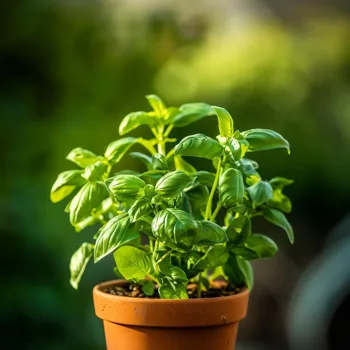
So, get started today and embark on your own organic herb gardening adventure!
AI Generated Content. Glance/InMobi shall have no liability for the content